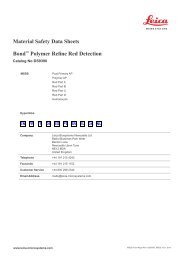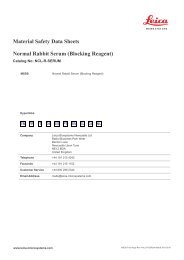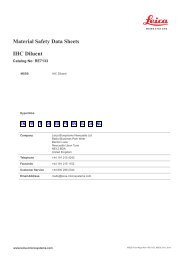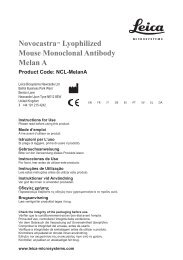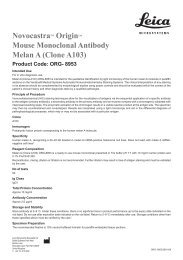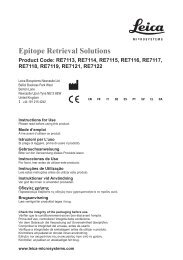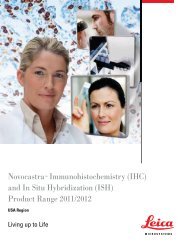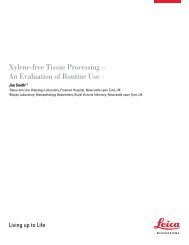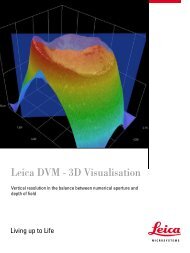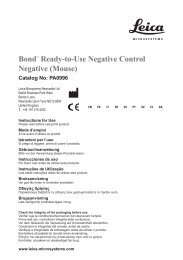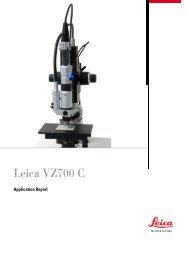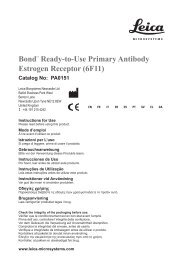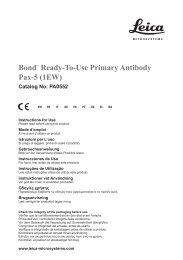Labelling Review row-Online
Labelling Review row-Online
Labelling Review row-Online
Create successful ePaper yourself
Turn your PDF publications into a flip-book with our unique Google optimized e-Paper software.
Buffers<br />
Epitope Retrieval Solution pH9<br />
1 L pH9 (x10 Concentrate) RE7119 P (HIER)<br />
Novocastra Epitope Retrieval Solutions are intended for Heat Induced<br />
Epitope Retrieval (HIER) on formalin-fixed, paraffin-embedded tissue<br />
sections as part of an immunohistochemical procedure. HIER using an<br />
appropriate pH solution improves the staining of some antibodies by<br />
exposing epitopes within tissue that has been masked during fixation. The<br />
development of Epitope Retrieval using heat was first reported in 1991 by Shi<br />
S-R et al. Journal of Histochemistry and Cytochemistry 39: 741-748 (1991).<br />
Since then numerous studies have been published looking at the effects of<br />
molarity, pH and heating methods on epitope retrieval. A universal HIER<br />
technique suitable for all epitopes does not exist. A combination of different<br />
heating methods and epitope retrieval solutions may be used to optimize<br />
unmasking of antigens where this technique is recommended. HIER is not<br />
recommended for all antibodies. Optimum conditions for epitope retrieval<br />
should be validated by the user, as these are dependant upon tissue, fixation<br />
and/or primary antibody. RE7119 and RE7224 are supplied as a 1 L volume,<br />
sufficient to prepare 10 L of working solution.<br />
Kidney pre-treated with Epitope Retrieval Solution pH9 (RE7119). Staining for Wilms' tumor<br />
protein using NCL-L-WT1-562. Paraffin section.<br />
/ 182<br />
For detailed information on all products please visit our website:<br />
www.leica-microsystems.com<br />
Enzyme Proteinase K (IHC)<br />
100 mL kit RE7160-K P (Enzyme)<br />
IVD IVD<br />
Enzyme pretreatment of formalin-fixed, paraffin-embedded tissue sections<br />
improves the staining of some antibodies by exposing epitopes within tissue<br />
that have been masked during fixation. The first proteolytic enzyme<br />
employed for epitope retrieval was trypsin. More recently, proteinase K<br />
which is commonly used in in situ hybridization techniques has been<br />
reported to be of use.<br />
Product Specific Information<br />
Novocastra Enzyme Proteinase K (IHC), RE7160-K, is intended for the<br />
enzymatic pretreatment of formalin-fixed, paraffin-embedded tissue sections<br />
prior to incubation with a primary antibody in an immunohistochemical (IHC)<br />
procedure. This product can be used for epitope retrieval with Novocastra<br />
antibodies for which trypsin is recommended, known exceptions to this are<br />
NCL-C-JEJUNI, NCL-BrdU, NCL-CYCLIN D1, NCL-COLL-IIp, and NCL-CYCLIN<br />
D1-GM. This two part kit comprises 0.75 mL of Enzyme Proteinase K<br />
Concentrate, RE7126, and 100 mL of Enzyme Proteinase K Buffer, RE7127,<br />
sufficient to produce 100 mL of working strength enzyme solution. This<br />
product is used in an IHC procedure, which allows the qualitative<br />
identification by light microscopy. Epitope retrieval by enzymatic<br />
pretreatment is recommended for a limited number of antibodies. Optimum<br />
conditions for epitope retrieval should be validated by the user as these are<br />
dependent upon tissue, fixation and/or primary antibody.<br />
Liver pre-treated with Enzyme Proteinase K (RE7160-K). Staining for Cytokeratin 8/18 using<br />
NCL-L-5D3. Paraffin section.<br />
Products in this catalog are subject to regulatory approval.<br />
This catalog is not for use in the USA.



